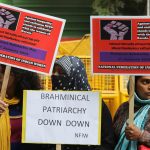‘Better to be born a cow in India today’
In this second of a two-part series on the run-up to India’s national election, activist Brinda Karat details two major issues facing the country: mob lynchings and violence against women.
Author:
13 March 2019

Question: The Supreme Court of India has made some sharp statements against “mobocracy”, the rule of the mobs. It has told the government to rein in the mobs. This is itself an indictment against the government. Despite this, India’s ruling party, the Bharatiya Janata Party (BJP) says that it will not move against mob lynching – the killing of people in the cattle trade, for example. It almost suggests that there is a “good lynching” – a lynching to create a society that favours the BJP and Rashtriya Swayamsevak Sangh (RSS). One RSS leader said, “Lynching will stop if people stop eating beef”. What do you make of the lynching epidemic and of the disregard by the RSS-BJP of the Supreme Court?
Brinda Karat: In 2015, a mob in Dadri, Uttar Pradesh, alleged that Mohammed Akhlaq slaughtered a cow, so they killed him. This crime was justified by the RSS-BJP. It was a sign of what was to come. The frequency of mob lynching has made the crime almost normal. You can be lynched for what you eat, for what you are, for what you say and for whom you want to marry. The RSS-BJP seem to suggest that some lynching is good, that those who participate in this kind of lynching are not criminals but heroes. BJP ministers go to events and garland the criminals who lynched our fellow citizens. This is a very dangerous, shocking and reprehensible situation.
Related article:
What do they say is a good lynching? If a mob kills a Muslim man who dares to marry a Hindu girl – what the BJP sensationally calls love jihad – that is seen as a good lynching. If a mob attacks Muslims for offering prayers in a public space, that is seen as a good lynching. If a mob attacks young couples for celebrating Valentine’s Day, that is seen as a good lynching. In each case, the mob is defended by the RSS-BJP. It is equally disturbing that the police in many cases and sometimes also the judiciary have been protective towards these men. False charges are made against the families of those who are killed by the mob, and the courts have taken these charges seriously. Akhlaq’s family has been threatened with arrest for cow slaughter – which never happened. It is a totally false case. Meanwhile, the killers of Akhlaq walk the streets.
Junaid Khan – killed on a local train in 2017 – is unlikely to get justice. The First Information Report of the police suggests that Khan’s killers did so in self-defence. Once you accept that there is “good lynching”, there is no end to this nightmare. In spite of the Supreme Court’s warning to the government, top-level ministers have given official sanction to the Gau Raksha (cow protection) groups – when they are in fact nothing other than murderers. The government says it does not have money for issues that would pertain to women’s rights, but it has money to protect cows. There is even a ministry for the protection of the cow. Modi’s government says it does not have surplus land to give to the landless rural poor, but it allots generous amounts of land for cow shelters. Cow protection takes priority over the welfare of humans. Better to be born a cow in India today. Immediate action needs to be taken against the killers. There needs to be a law against mob lynching. But the Modi government has no desire to frame any such law.
Violence against women
Question: A recent study by Reuters ranked India as the most dangerous place for women in the world. What makes India such a cruel society in terms of women’s freedom?
Karat: There has certainly been a marked increase not only in the incidence of violence against women, but also in the brutality of the violence in India. There are cases of violence against women where they are tortured, burned, beaten, raped and even killed. The details are horrific. What are the reasons? There are many, but at least one is that over the past several decades, women have entered public spaces to work and to live. They have established their talents, their skills and their capacities in numerous spheres. There has been a backlash against this increased assertion.
The backlash is shaped by extreme misogyny – or a strong feeling in sections of our society that women have a specific place and anyone who crosses the boundary is liable to be punished. These cultural walls behind which women and girls are expected to live (with some exceptions for certain classes) are stronger than the high walls of a prison. When a woman is raped, she is blamed for entering public space, for being a free citizen, for the clothes she wears, for the person she speaks to, for the place and time where she was. It is the woman who is held responsible for the crime. That is the character of the misogyny.
Related article:
The backlash to women’s entry into public space is not spontaneous. It is not a natural reaction. It is shaped by conservative forces, including religious orthodoxy and Brahmanical institutions. The backlash is refracted through hierarchies of religion and caste. We are seeing an increase in crimes against Dalit women who work in vulnerable situations each day, particularly in rural India. Their vulnerability to sexual harassment is greater because of the material conditions of their lives. The idea of “honour killings” has now become almost normal in India.
As more girls go to schools and colleges, and as more young people have the opportunity to meet each other, the likelihood of cross-caste and cross-religious romances grows. If a woman tries to assert her choice of a life partner against her family’s wishes (particularly if she wants to marry outside the boundaries of caste and religion), then there is a likelihood that she might be killed. This murder is known sickeningly as an “honour killing”. In rural areas, the Khap Panchayat [clan assembly] emerged as the keepers of feudal traditions. Many of them have authorised the murder of young people for making their own life choices.
In Kathua (Jammu and Kashmir), an eight-year-old girl was raped and murdered in January 2018. She was targeted because she was a Muslim girl, a child of the Bakarwal community. The murder took place to send a message to the community that they should not settle in that region. It was a brutal killing. The BJP leaders in the area did not call for justice. Instead, they demonstrated on behalf of the accused. That is their attitude to these killings. The RSS-BJP denies the existence of such so-called honour crimes. During the government of BJP leader Atal Bihari Vajpayee (1998-2004), the United Nations released a report on such “honour killings”. The Indian representative to the UN said no such crime takes place in India. That is why the Indian government does not collect data on these crimes, nor does it take them seriously. Khap Panchayats are given free rein because they are used to mobilise votes in rural areas. The RSS-BJP want to create separate schools for girls and boys, to deny women entry into public space and to empower parents to control their children’s movements. This is their “solution” to the problem.
As a result of the callous attitude of the government, India has one of the lowest rates of conviction for crimes against women. In any given year, at least 70% of cases are in the “pending” category – that is, they are yet to be heard and decided by the courts – and of the cases heard and decided, 75% to 80% of the accused walk free. Some people want to bring the death penalty to India as a way to tackle these kinds of killings. I am against the death penalty in principle. Apart from all the other reasons, it is certainly not going to solve the problem or lessen the rate of crimes against women. On the contrary, as women’s organisations in India have argued, it could lead to more killings of the victims of rape so as to ensure she does not give witness. The struggle has to be for the certainty of punishment. We do certainly need stringent punishment for barbaric sexual crimes which should include life imprisonment.
Brinda Karat has been a member of the Communist Party of India (Marxist) (CPI(M)) for almost five decades and was elected to the CPI(M)’s politburo in 2005. She began her party work in the trade union movement and then led the All-India Democratic Women’s Association from 1993 to 2004.
Since 2006, Karat has been working with the Adivasi Adhikar Rashtriya Manch, a platform of indigenous communities. She was a member of India’s Parliament from 2005 to 2011.
Part One:
This is an edited excerpt from an interview first published by the Tricontinental: Institute for Social Research.



